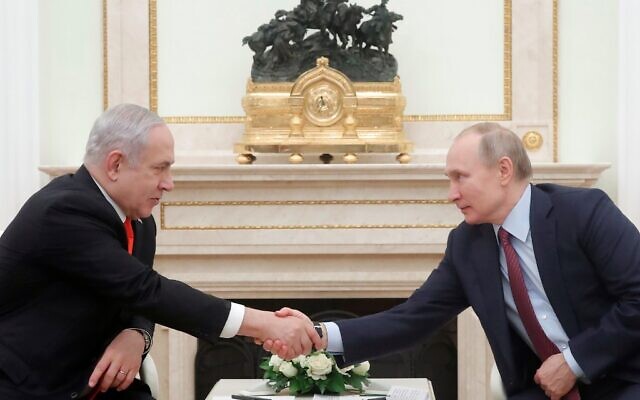Prime Minister Naftali Bennett and Russian President Vladimir Putin met in Sochi on Friday morning for their first face-to-face talks since Bennett took office earlier this year.
Putin told Bennett that the pair had “many problematic issues” to discuss, but also many “points of contact and opportunities for cooperation, in particular when it comes to fighting terrorism.”
The Russian president also told Bennett — who became prime minister in June, ousting Benjamin Netanyahu after 12 years — that he hoped and expected for Israeli-Russian relations to continue smoothly.
“I truly hope that despite the internal political battles, which are unavoidable in every country, your government will pursue a policy of continuity on Russian-Israel relations,” said Putin, noting his close ties with the previous Israeli government.
In his own comments, Bennett noted that the pair was going to “discuss the situation in Syria as well as efforts to halt Iran’s nuclear weapons program.” The prime minister added that talks between the nations “will be based on the deep connection between the two countries. We consider you a true friend of the Jewish people.”
Bennett told Putin that expects to “discuss with you a whole range of current issues, to strengthen ties between the countries in economic, technological, scientific and cultural matters.” The prime minister also updated the Russian president about efforts to construct a museum in Israel commemorating Jewish soldiers who fought in various armies during World War II, including in Russia’s Red Army.
Prime Minister Naftali Bennett meets with Russian President Vladimir Putin in Sochi, Russia, on October 22, 2021. (Kobi Gideon/GPO)
Bennett departed for Russia from Israel at 5 a.m. Friday morning, landed some three hours later and will spend around five hours in the country before jetting back to Israel before Shabbat begins at sundown. His talks with Putin are expected to focus on Iran and Syria, and he is accompanied by National Security Adviser Eyal Hulata, diplomatic adviser Shimrit Meir and the prime minister’s military secretary, Maj. Gen. Avi Gil. Housing Minister Ze’ev Elkin, a native Russian speaker, also accompanied the prime minister to provide translation and advice.
“The ties between Russia and Israel are a significant element in the foreign policy of the State of Israel due to both the special status of Russia in the region and its international role, and to the million Russian-speakers in Israel, who constitute a bridge between the two countries,” Bennett said on the tarmac before departing Friday morning. “In general, the foreign policy and international status of Israel are significantly strengthening. There is considerable energy and the direction is very good.”
Putin and Bennett spoke two weeks ago when Bennett congratulated Putin on his 69th birthday.
“The two will discuss a series of diplomatic, security and economic issues involving both countries, as well as important regional matters, primarily Iran’s nuclear program,” the Prime Minister’s Office said when the visit was announced several days ago. His spokesperson said the trip came at Putin’s invitation.
Netanyahu boasted of a close relationship with Putin, which he claimed created the space for Israel to wage a years-long air campaign against Iran-backed fighters in Syria. That campaign has continued under Bennett, although recent reports have pointed toward tensions in the Israel-Russia relationship over policies toward Syria.
According to a report earlier this week, Netanyahu promised Putin that he would “be back soon” in office following his ouster in June. Netanyahu, who has repeatedly tried to delegitimize Bennett and his new government, has long argued that only his personal relations with Putin kept Israel from clashing with Russia in Syria, where both their militaries operate.

Russian President Vladimir Putin meets with Prime Minister Benjamin Netanyahu at the Kremlin in Moscow on January 30, 2020. (Maxim Shemetov/Pool/AFP)
Russia is also a member of the P5+1 group of countries that negotiated the Iran nuclear deal, with talks on the US rejoining the moribund pact possibly set to resume sometime soon, according to officials.
Israel has lobbied against the resumption of the deal and pushed for a concerted international effort to keep Iran from developing nuclear weapons. On Thursday, Finance Minister Avigdor Liberman, whose political base is largely made up of Russian speakers from the former Soviet Union, said a military clash with Iran was “only a matter of time.”
Another item on the agenda is expected to be Israeli recognition of the Russian Sputnik COVID vaccine among incoming tourists. On Thursday, Israel announced that vaccinated tourists will be allowed to enter Israel beginning November 1, but only those with vaccines approved by the World Health Organization, which does not include the Sputnik shot.
Bennett’s visit follows a trip by Foreign Minister Yair Lapid to Moscow last month, where he met with his Russian counterpart Sergei Lavrov. The Walla news site later reported that during that meeting, Lavrov asked for Israel to push the United States to agree to hold trilateral talks on the ongoing conflict in Syria.
Israel has carried out hundreds of airstrikes inside Syria in the course of the country’s civil war, targeting what it says are suspected arms shipments believed to be bound for Lebanon’s Iran-backed Hezbollah terror group, which is fighting alongside Syrian government forces. Israel rarely acknowledges or discusses such operations.